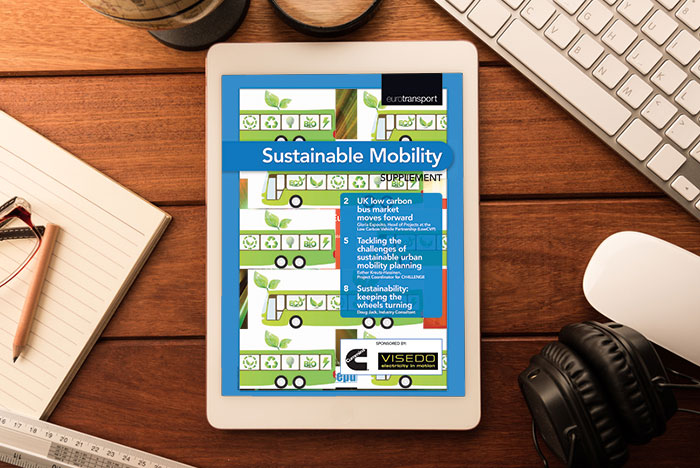Sustainable Mobility supplement 2014
- Like
- Digg
- Del
- Tumblr
- VKontakte
- Buffer
- Love This
- Odnoklassniki
- Meneame
- Blogger
- Amazon
- Yahoo Mail
- Gmail
- AOL
- Newsvine
- HackerNews
- Evernote
- MySpace
- Mail.ru
- Viadeo
- Line
- Comments
- Yummly
- SMS
- Viber
- Telegram
- Subscribe
- Skype
- Facebook Messenger
- Kakao
- LiveJournal
- Yammer
- Edgar
- Fintel
- Mix
- Instapaper
- Copy Link
Posted: 24 October 2014 | Intelligent Transport
In our latest free-to-view Sustainable Mobility Supplement, Gloria Esposito from the LowCVP takes a look at the UK low carbon bus market; Esther Kreutz-Hassinen gives details about the CH4LLENGE project she coordinates; and Industry Consultant Doug Jack takes a look at the different low carbon bus vehicles available…


- UK low carbon bus market moves forward
The advancement of low carbon vehicles is at the heart of the UK’s climate change agenda that sets an ambitious target of reducing greenhouse gas emissions by 80% by 2050, writes Gloria Esposito – Head of Projects at the Low Carbon Vehicle Partnership (LowCVP). Low carbon buses are a key part of the UK’s roadmap to reducing CO2 emissions, an integral feature of sustainable transportation in cities and driving improvements in urban air quality. In parallel with environmental benefits, the manufacturers of low carbon buses have a role to play in stimulating economic growth through investment in the automotive industry in the UK. - CH4LLENGE …tackling the challenges of sustainable urban mobility planning
The development of Sustainable Urban Mobility Plans (SUMPs) in cities is high on the European agenda. The European Commission recognised the need for more sustainable and integrative planning processes in their Urban Mobility package, published in 2013 and numerous projects are supporting cities in developing their plans. Despite all effort, implementation of SUMPs is challenging for cities. The CH4LLENGE project starts from here to figure out and work on the most pressing challenges and barriers in sustainable urban mobility planning. Esther Kreutz-Hassinen – Project Coordinator for CH4LLENGE, explains more. - Sustainability: keeping the wheels turning
For many years, there have been increasing warnings that the world will one day run out of fossil fuels, writes Doug Jack – Industry Consultant. Furthermore, some of the most abundant deposits are in countries where there can be trading difficulties or political instability. Just think of he current situations in Iraq, Libya and Russia. In parallel, there have been dire warnings about global warming and CO2 emissions. The developed countries are the largest users of fossil fuels and they are leading the way with tough legislation to reduce carbon emissions.
Related topics
Air Quality, Fleet Management & Maintenance, Sustainable Urban Transport
Issue
Issue 5 2014
Related people
Doug Jack, Esther Kreutz-Hassinen, Gloria Esposito








